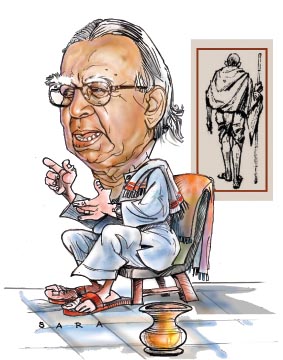The death of Rajavarothiam Sampanthan marks the end of an epoch in Sri Lankan politics, particularly in the context of the Tamil people’s long and turbulent journey for justice and autonomy. Sampanthan, who passed away on 4 July 2024, at the age of 91, was a towering figure in the Tamil National Alliance (TNA) and an indefatigable advocate for the rights of Tamils in Sri Lanka. His demise leaves a void in Tamil political leadership that will be difficult to fill.
Sampanthan’s political career spanned over six decades, during which he became a symbol of resilience and moderation. He entered politics in 1956, a period marked by rising ethnic tensions between the Sinhalese and Tamils. He rose to prominence in the Ilankai Tamil Arasu Kachchi (ITAK) and later became the leader of the TNA.
Unlike many of his contemporaries who turned to militancy, he remained committed to non-violent political means. His leadership during the war and in its aftermath was crucial in steering Tamil politics towards democratic engagement, even in the face of immense adversity and repression. Sampanthan’s tenure as the Leader of the Opposition from 2015 to 2018 was a testament to his statesmanship. He was the first Tamil to hold this position in over three decades, symbolising a rare moment of hope for reconciliation and inclusivity in Sri Lankan politics. His approach was always one of seeking common ground, advocating for a united, yet pluralistic, Sri Lanka where all ethnic groups could coexist with dignity and equality.
He was instrumental in articulating the aspirations of the Tamil people while also engaging with the Sinhalese leadership and international community. Sampanthan’s nuanced diplomacy played a significant role in bringing Tamil issues to the forefront of national and international discourse, especially during the peace talks and constitutional reforms.
Sampanthan’s political journey was not without its challenges. The end of the civil war in 2009 brought a complex new phase of political struggle for Tamil leaders, marked by calls for justice, accountability, and autonomy. Sampanthan faced criticism from some quarters for what was seen as a conciliatory stance towards the Government. Yet, his unwavering belief in dialogue and constitutionalism underscored his conviction that lasting peace could only be achieved through inclusive political solutions rather than through division and conflict.
His legacy is a multifaceted one. To many Tamils, he remains a beacon of their struggle for rights and recognition. To the broader Sri Lankan populace, he is a symbol of the possibilities of reconciliation and peaceful coexistence. His leadership style, characterised by patience, persistence, and a deep commitment to democratic principles, is a model for future generations of leaders.
As the Tamil community and the entire nation mourn the passing of R. Sampanthan, there is a profound sense of reflection on the path forward. His death brings into sharp focus the urgent need for continued advocacy for Tamil rights and broader ethnic harmony in Sri Lanka. The TNA and other Tamil political entities face the daunting task of filling the void left by his absence and navigating the complex landscape of nationalist politics. It would be tempting to many to take Tamil politics back towards the path of nationalism. This journey has definitely been made easier due to the many broken promises and the shrinking of space to deliver a meaningful resolution to the ethnic problem.
However, it is hoped that true statesmen emerge to fill the void left by the late Sampanthan. That would be his greatest legacy and best hope for the community he loved so dearly.
(Daily FT)
